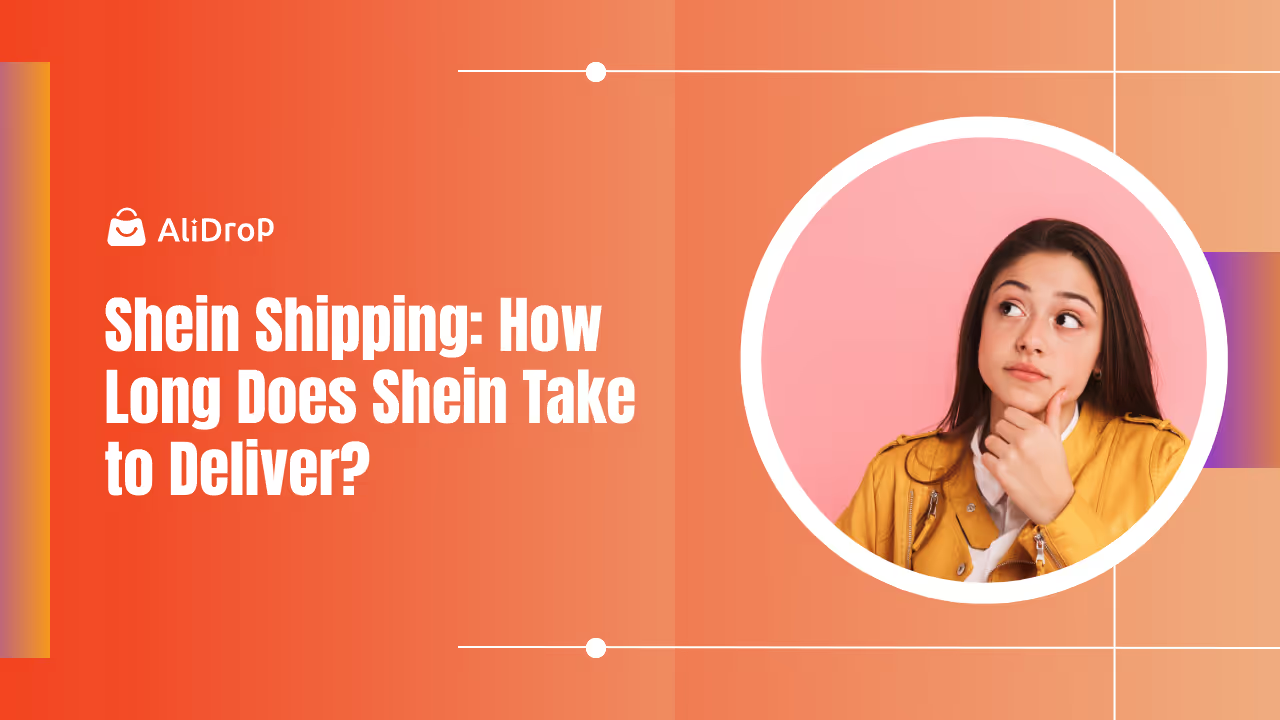If you’re looking for dropshipping platforms, don’t tie your business down to just one option. Doba might sound appealing with its catalog and range of suppliers, but it has its limits.
You want flexibility, better pricing, and suppliers that fit your business model, not random connections. Doba has its cons and its downsides can hold you back. There are other platforms that make dropshipping faster and easier with much better features. Check out these best Doba alternatives and let’s explore them below.
What is Doba?
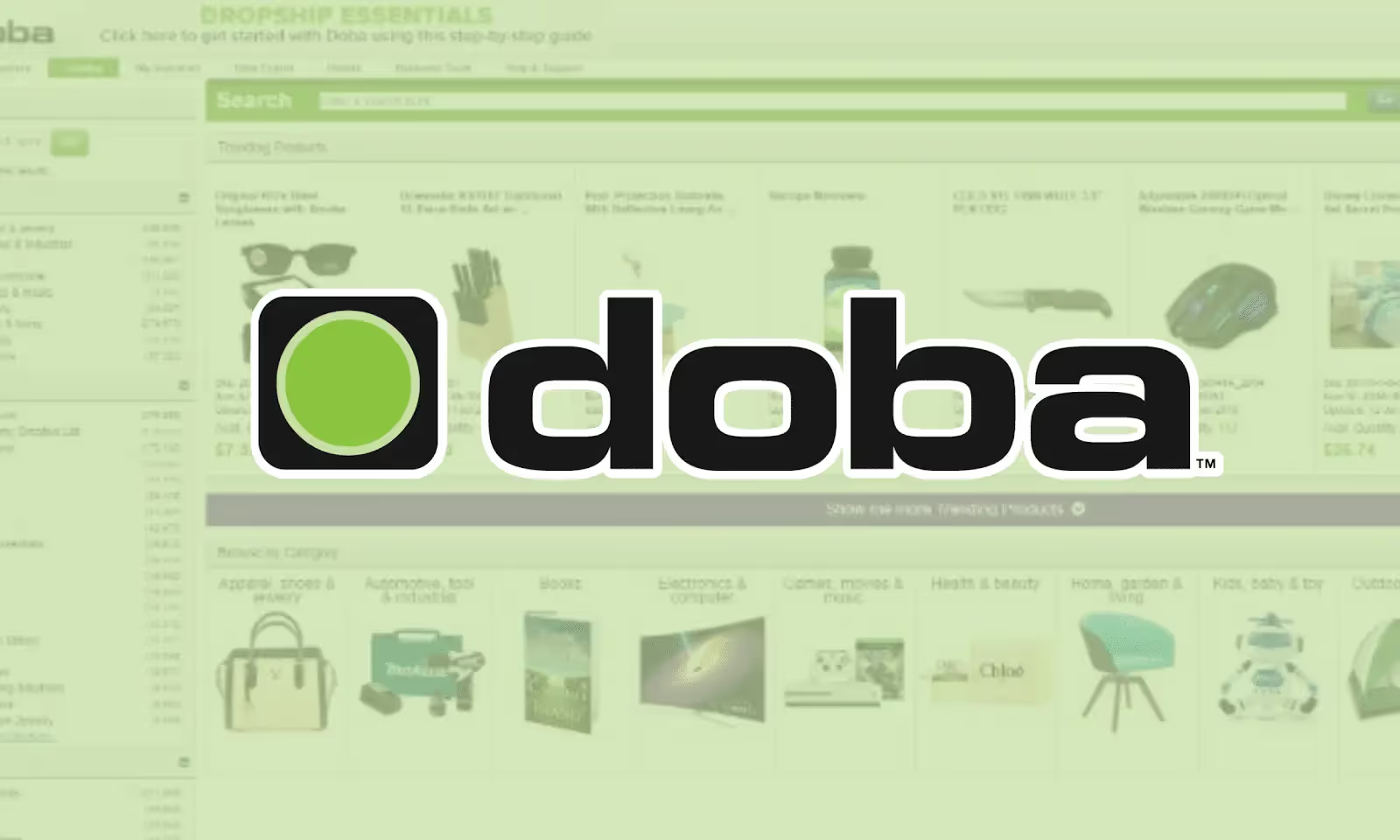
Doba is a dropshipping platform that connects online sellers with suppliers across multiple categories. Instead of chasing down individual vendors, you get access to thousands of products inside one dashboard. The concept is simple: you pick the items you want, list them on your online store, and Doba syncs the order details to the supplier when a customer buys. That way, you don’t have to carry stock or manage warehouses.
What makes Doba interesting is how it packages supplier access. You can search through its catalog, see wholesale pricing, and import products into platforms like Shopify, WooCommerce, and eBay. It also promises to keep inventory data up to date, so you don’t sell items that are out of stock. For new dropshippers, this can sound like a safer bet.
But here’s the thing—Doba is more of a connector than a business growth engine. You’ll pay a monthly subscription just to browse its catalog, and the products may not always come with the best margins. You’ll still need to manage your pricing, marketing, and customer service. In short, Doba is a middle layer that simplifies vendor access, but it doesn’t magically make you profitable on its own.
How Does Doba Work?
Doba works by letting you browse its supplier catalog, pick products, and push them to your store. When an order comes in, Doba sends the request to the supplier, who then ships the product directly to your customer. You’re the middle manager, not the warehouse.
Product Sourcing and Catalog Access
Doba has a central catalog where you can find items across niches like electronics, fashion, and home goods. You choose what fits your store and publish it. The platform shows wholesale prices alongside retail suggestions, but profit margins aren’t always great. Some sellers end up competing against identical listings from other Doba users. That’s why catalog size doesn’t always mean strong product opportunities.
Inventory and Order Sync
Doba tracks supplier inventory in real time and updates your product listings. The promise is that you won’t oversell or advertise out-of-stock goods. When a buyer places an order, Doba syncs the details with the supplier. You’re not handling boxes or printing labels. While this saves time, there are delays because you still depend on supplier response speed, not your own control.
Store Integrations
Doba integrates with Shopify, BigCommerce, WooCommerce, and eBay. Once connected, you can push product listings directly into your storefront. The integration includes automated updates, so changes in pricing and stock reflect instantly. But integration doesn’t replace strategy—you still need ads, customer acquisition, and after-sales service. Without that, you’re just another store reselling the same catalog everyone else has access to.
Downsides of Using Doba
Doba looks easy at first glance, but the cracks show once you start working with it. Here are the most common issues users complain about.
- High Subscription Fees: Doba charges a monthly fee just to access its catalog, even if you don’t make sales. For beginners, this is money lost before you even test product demand. Paying to browse suppliers feels unnecessary when many other platforms let you start free.
- Thin Profit Margins: Because so many sellers use the same catalog, products often get priced down in competitive markets. You’ll find yourself cutting prices just to move inventory. In the end, your margins might not cover marketing spend, which kills long-term profitability.
- Lack of Unique Products: Doba doesn’t give you exclusivity with suppliers. That means hundreds of other dropshippers can sell the same items as you, sometimes at lower prices. Standing out requires more effort in branding, packaging, and marketing. Without that, you’ll blend into the crowd.
- Limited Supplier Transparency: You don’t always know who the supplier is or where they’re shipping from. If an order is delayed or quality is poor, you’re left dealing with angry customers. This creates reputational risks that are hard to recover from.
- Shipping Delays: Since Doba connects you to third-party suppliers, you have little control over shipping speed. Customers expect fast delivery, but delays can lead to refunds and negative reviews. This can cost you repeat buyers, even if it wasn’t your fault.
- Customer Support Complaints: Many sellers report slow responses from Doba’s support team. When your store relies on fast issue resolution, waiting days for help can be damaging. You’ll end up firefighting problems on your own, which takes time and energy.
- Extra Costs Over Time: Beyond the subscription, you may pay transaction fees or higher wholesale rates than going direct. These hidden costs add up quickly. Over months, you’ll realize you’re paying too much for too little return, especially compared to other platforms.
Why Go for Doba Alternatives?
Doba isn’t your only option, and it often feels like you’re paying more than you should. Here’s why many sellers jump to better alternatives.
- Lower Startup Costs: Many alternatives give you free trials or let you browse products without a paid subscription. That means you can test your store idea without sinking money into fees. It’s a smarter way to experiment before committing to one platform.
- Better Product Variety: Some platforms focus on trending products or niche-specific catalogs. This makes it easier to stand out instead of competing with generic listings. When you sell unique items, your store feels fresher and more attractive to customers.
- Verified Suppliers: Doba alternatives highlight vetted suppliers with proven track records. This reduces the risk of poor quality shipments. You’ll spend less time chasing refunds and more time building repeat customers. Supplier reliability directly impacts your store’s survival.
- Faster Shipping Options: Doba alternatives can cut down delivery times dramatically. Instead of waiting weeks for overseas packages, customers get their orders in days. Faster shipping improves reviews and builds loyalty, which keeps your sales consistent.
- Higher Profit Margins: Some Doba alternatives let you connect directly with suppliers or offer better wholesale pricing. Cutting out middle fees puts more profit in your pocket. Even a few dollars per order can scale into big differences at higher sales volume.
- Extra Store Tools: Doba alternatives often come bundled with marketing tools, AI store builders, or analytics dashboards. Instead of juggling multiple apps, you get an integrated setup. This saves time, reduces costs, and gives you a tighter grip on store management.
- Responsive Support: Good customer service can save you from disaster when orders go wrong. Platforms with 24/7 support or faster ticket response times are worth it. You’re not left alone trying to fix supplier mistakes while losing customers.
8 Best Doba Alternatives in 2025
Here are the top Doba alternatives in 2025:
1. AliDrop
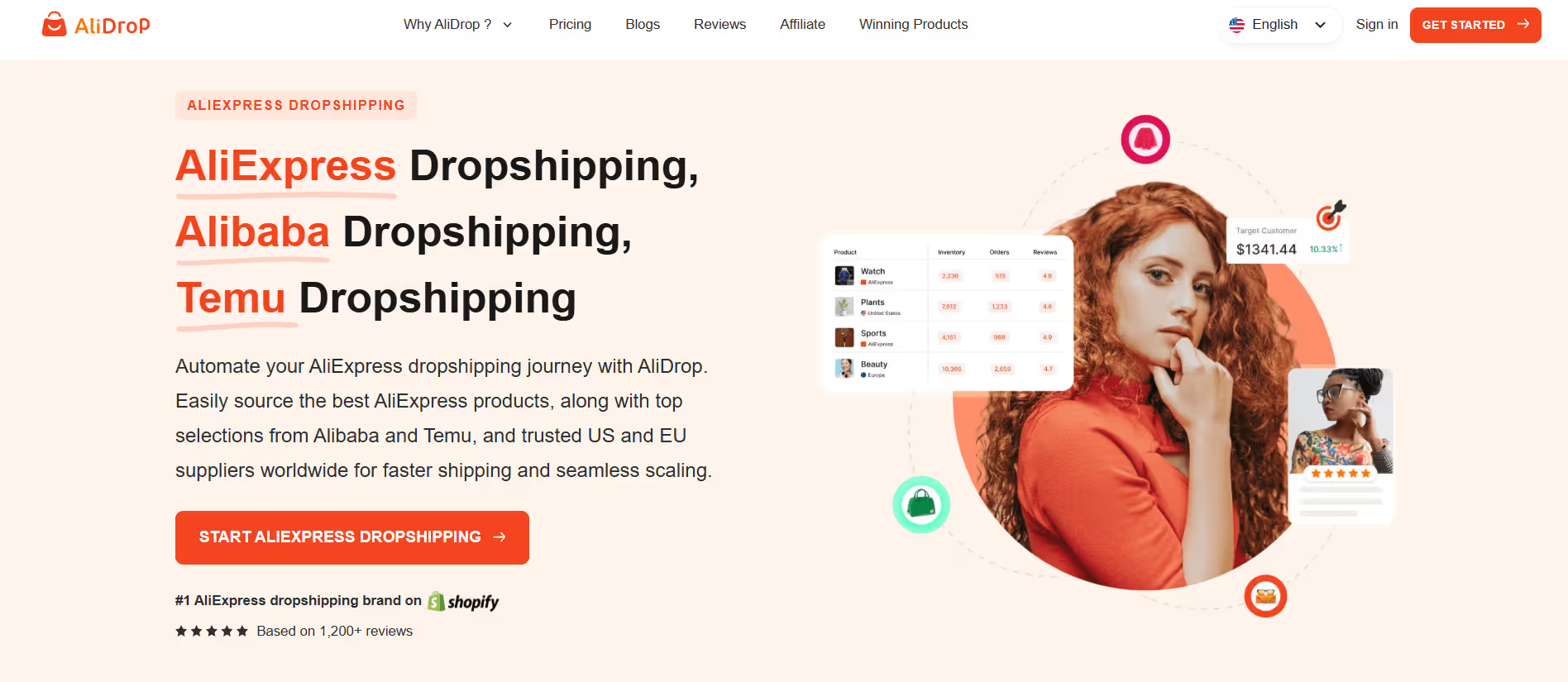
AliDrop makes AliExpress, Alibaba, and even Temu dropshipping easier. It offers product import tools, automated order processing, and even helps you create and launch your own dropshipping store. Sellers can run a Shopify store while pulling products directly from suppliers in the US, EU, and Asia. The real benefit is you don’t have to worry about manually managing imports or chasing down suppliers.
Key Features:
- AliExpress, Alibaba, and Temu Dropshipping: You can pick suppliers from Asia, US, or EU and diversify your store inventory. Check out the Alidrop marketplace.
- Winning Products: Instead of digging through AliExpress, you can browse a curated list of products. These items are already gaining traction, so you’re not guessing demand. Sellers get to save research time while staying closer to trends.
- One-Click Product Import: AliDrop’s import tool lets you move products directly into your store. You skip manual copy-pasting of descriptions and images. That means faster product listings and fewer errors compared to doing it by hand.
- Automated Fulfillment: When an order comes in, AliDrop sends it to the supplier automatically. You don’t have to fill out customer details each time. It saves hours every week, especially when sales volume grows.
- AI Shopify Store Builder: The platform includes an AI tool that builds a ready-to-sell Shopify store. It covers product pages, layouts, and branding elements. You can launch faster without hiring dedicated developers.
- AI Product Description Generator: Writing copy for hundreds of items can be exhausting. AliDrop’s AI product description generator creates descriptions in minutes.
2. Spocket
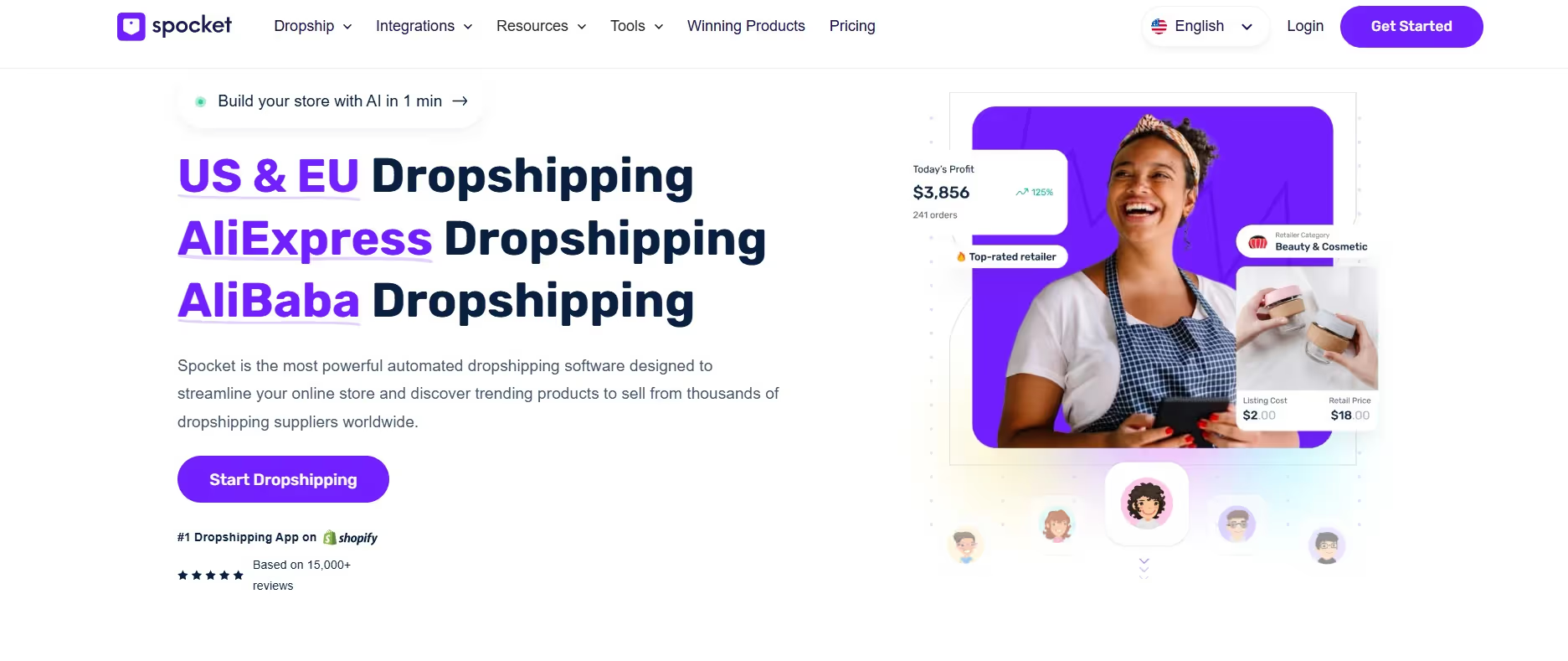
Spocket is one of the most popular dropshipping platforms for sellers who want verified US and EU suppliers. You can find winning products in any niche, including fashion, footwear, electronics, and others. The platform offers branded invoicing, has no MOQs, and provides 24/7 VIP customer support. Many sellers like Spocket because of its fast shipping times. You can also discover millions of winning products with its product research tools and do automated dropshipping. Spocket also supports Wix, WooCommerce, and other e-commerce store integrations.
Key Features:
- US and EU Suppliers: Spocket gives you access to thousands of suppliers in North America and Europe. That means faster shipping times and better product quality control. You can also find millions of trending dropshipping products on the app.
- Verified and Vetted Suppliers: Every supplier on Spocket passes a quality check before being listed. This minimizes risks of poor packaging, counterfeit goods, or slow fulfillment. For dropshippers, reliable suppliers are the backbone of customer trust.
- Cross-Selling Capabilities: You can bundle related products together to increase cart size. For example, pairing a phone case with a wireless charger. This gives you higher revenue per order without needing extra marketing spend.
- Automated Inventory Management: Spocket syncs stock levels with suppliers so your store never sells items that are out of stock. Pricing updates also flow into your storefront. This automation saves time and prevents customer disappointment.
- Print-on-Demand Services: You can offer personalized products like custom t-shirts, mugs, or tote bags. Spocket handles the production and shipping. Adding personalized items lets you create stronger brand connections.
- Branded Invoicing: Unlike Doba, Spocket lets you add your logo and business details to invoices. Customers feel like they’re buying from your brand, not a random supplier. This improves loyalty and makes repeat sales easier.
- Flexible Pricing Plans: Spocket has a free plan to browse suppliers, plus paid tiers like Starter, Professional, Empire, and Unicorn. Each plan unlocks more products and premium suppliers. This makes it easy to start small and scale when your store grows. Spocket offers a 14-day free trial.
3. Modern Dropship
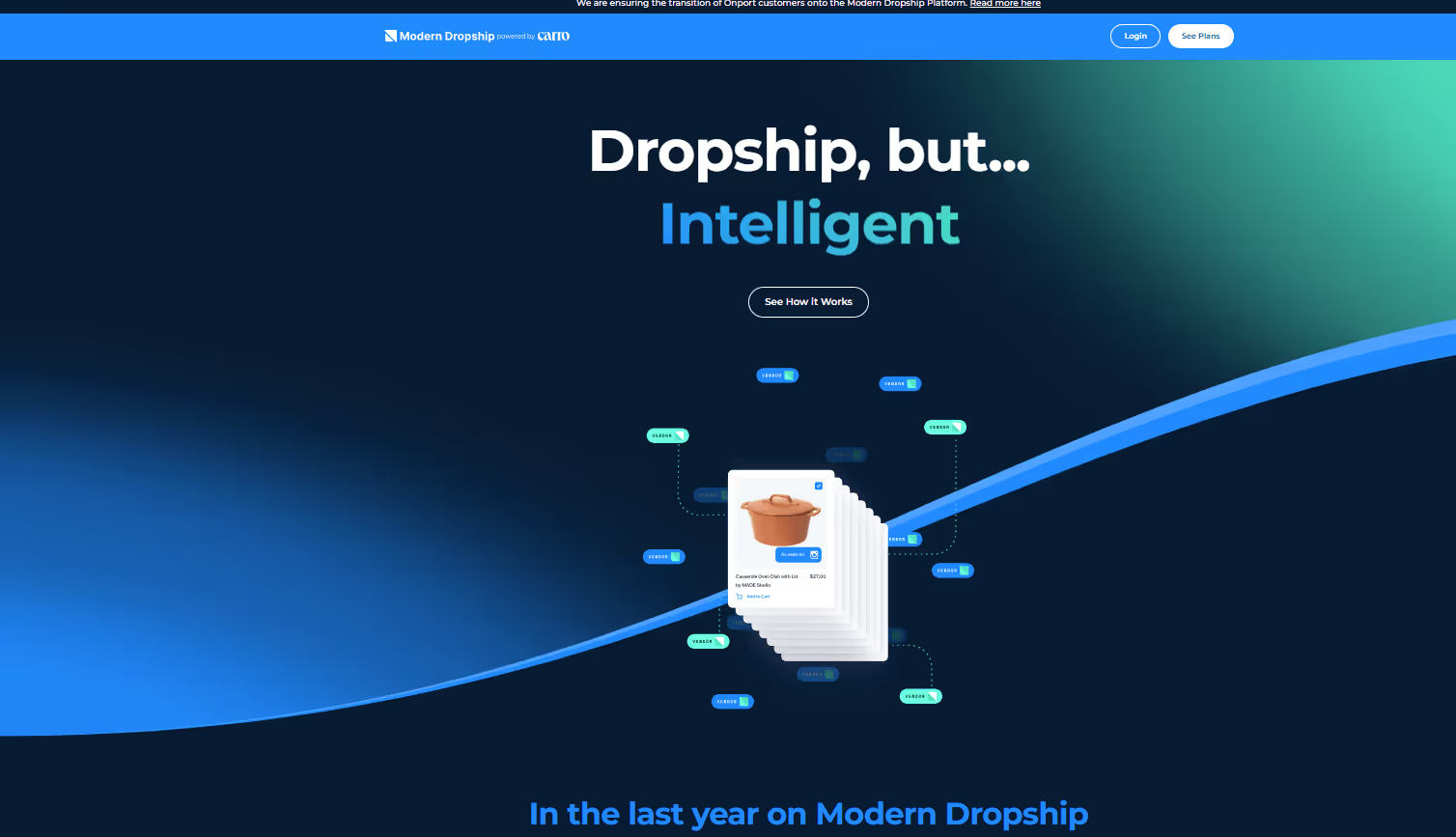
Modern Dropship is a newer player that focuses on simplifying supplier relationships for online sellers. It combines curated product catalogs with modern tech tools, making it easier to manage everything in one place. Unlike older platforms, Modern Dropship emphasizes niche products and quicker onboarding. You don’t just get a catalog—you get a dashboard designed to reduce hassle. The platform is gaining attention because it blends supplier access with digital selling tools.
Key Features:
- Curated Products: Modern Dropship filters out low-quality suppliers and focuses on trending products. This makes it less overwhelming for sellers compared to browsing massive catalogs. You spend more time selling instead of hunting for items that might not move.
- Integrated Analytics: The platform gives you data insights on product performance. You can track which items are moving faster and which ones lag. This helps you double down on winners instead of wasting time with dead stock.
- Simplified Supplier Communication: You can message suppliers directly within the dashboard. This saves time compared to emailing back and forth or chasing responses. Clearer communication reduces misunderstandings about shipping, returns, or product details.
- Faster Onboarding: Modern Dropship markets itself as easy for beginners. You can create an account and start browsing products quickly. Sellers don’t need deep technical knowledge to set up shop and connect suppliers.
- Flexible Store Integrations: The service connects with Shopify, WooCommerce, and other platforms. You can sync products directly to your store without complicated setup. This is helpful if you’re running multiple storefronts at once.
- Returns Handling Support: Modern Dropship provides structured processes for returns and refunds. Instead of figuring it out on your own, you get guidance within the system. This reduces frustration for both sellers and customers.
- Affordable Pricing Tiers: Unlike some platforms that lock you behind expensive subscriptions, Modern Dropship offers entry-level tiers. You can test features at lower costs before scaling. This makes it less risky for first-time sellers.
4. Rithum
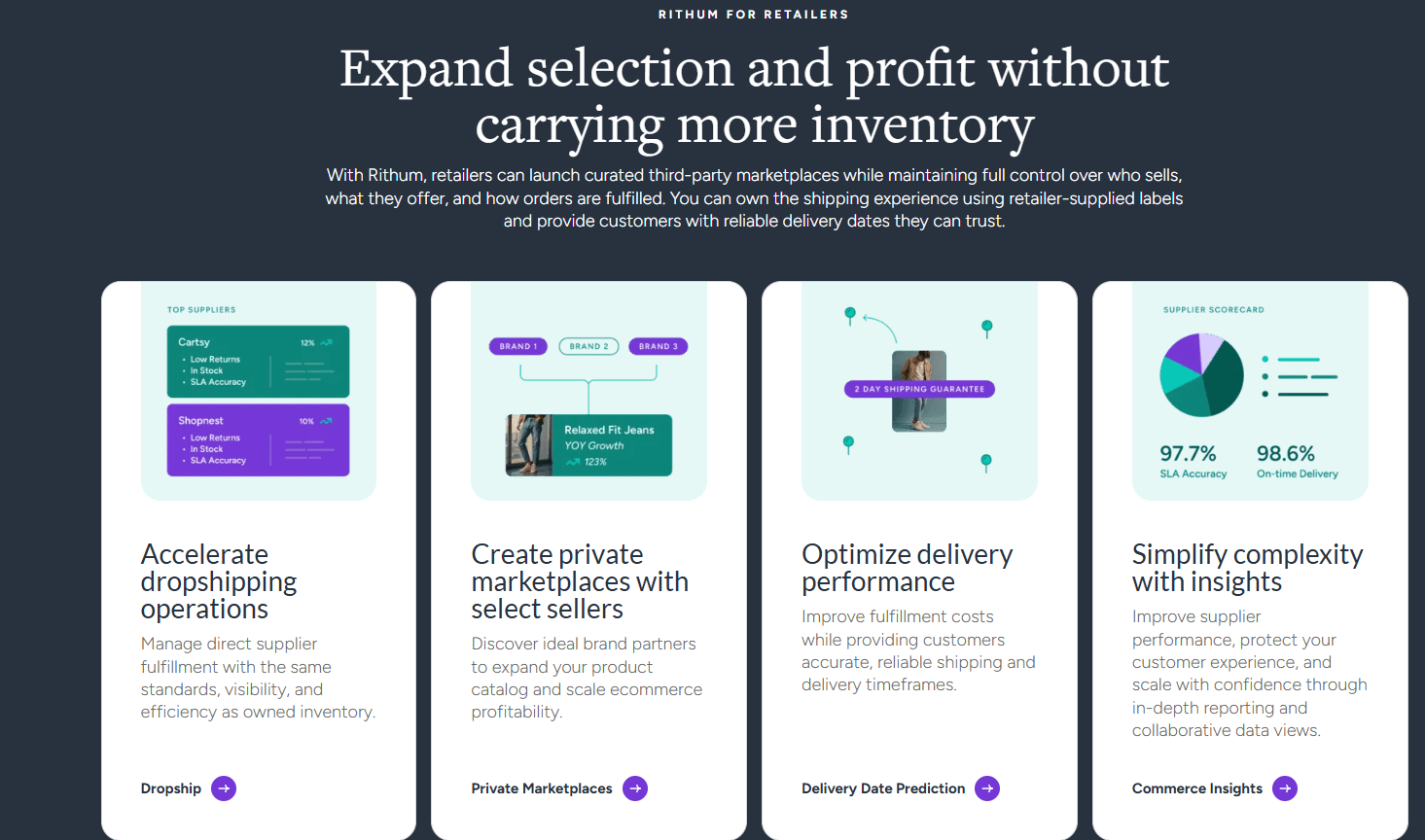
Rithum is a dropshipping and retail operations platform that was previously known as CommerceHub. It helps sellers manage multi-channel selling across Amazon, eBay, Walmart, and other big marketplaces. Unlike Doba, which is mostly a catalog subscription, Rithum positions itself as an enterprise-level solution. Large retailers and growing online sellers use it to synchronize inventory, automate orders, and expand across multiple channels without losing control of product data.
Key Features:
- Multi-Channel Selling: Rithum allows you to manage listings across platforms like Amazon, eBay, and Walmart from one dashboard. Instead of logging into each marketplace separately, you centralize control. This saves hours for sellers with large inventories.
- Advanced Inventory Sync: The platform keeps inventory updated across every channel. If you sell out of an item on Shopify, it updates listings on Amazon too. That reduces overselling risks and avoids customer cancellations.
- Order Routing System: Rithum automatically routes orders to the best supplier or fulfillment center. This ensures faster shipping and lower costs. For larger operations, automated routing is critical for maintaining service quality.
- Analytics and Reporting: You get detailed reports on sales performance, shipping costs, and supplier response times. This helps identify bottlenecks and areas where profit margins can improve. Sellers running at scale benefit most from this visibility.
- Retailer Partnerships: Rithum works with big-name retailers and suppliers. Smaller businesses gain access to supply chains that are usually out of reach. This expands product options beyond typical dropshipping platforms.
- Integration Support: The platform integrates with ERP systems and e-commerce software. That means you can connect Rithum to existing tools instead of rebuilding your stack. Larger companies often rely on this level of compatibility.
- Enterprise-Grade Tools: Rithum is designed with enterprise clients in mind. It includes compliance checks, shipping optimization, and bulk management features. Smaller sellers can still benefit but may find it heavier than simpler tools.
5. Shiprocket
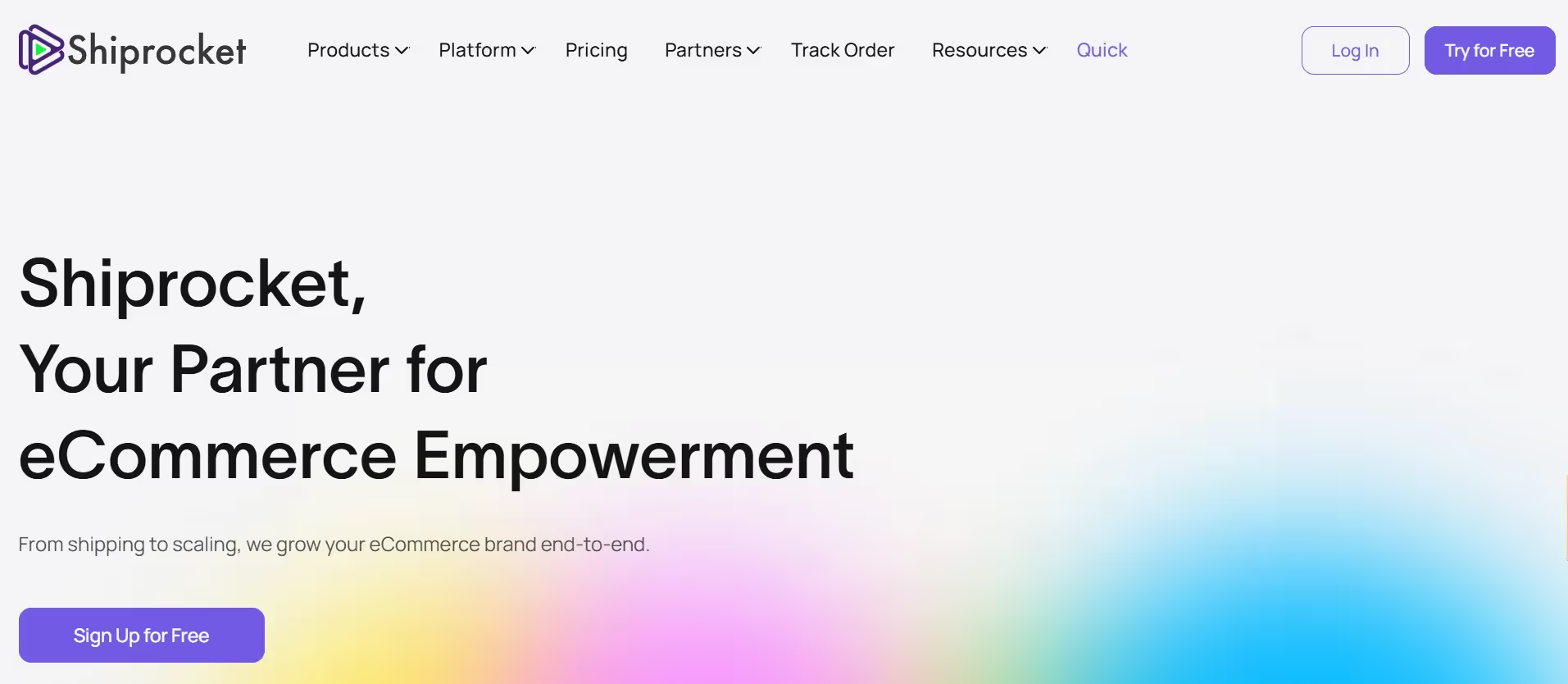
Shiprocket is an Indian logistics and fulfillment platform that also offers dropshipping services. It’s not just about connecting you to suppliers—it handles order shipping, tracking, and returns. Many sellers in India and Southeast Asia use Shiprocket because of its strong courier partnerships with companies like FedEx, Blue Dart, and Delhivery. The platform also supports international shipping, making it easier for small businesses to reach customers outside their home country.
Key Features:
- Wide Courier Network: Shiprocket partners with dozens of courier services. This gives you multiple shipping options at checkout, from economy to express. Sellers can compare pricing and choose the best delivery plan for each order.
- Automated Shipping Labels: You can generate and print shipping labels directly from the dashboard. This cuts down time wasted on manual paperwork. For stores processing high order volumes, automation becomes essential.
- Cash on Delivery Support: Shiprocket offers COD as a payment option in markets where it’s popular. This expands your potential customer base since many buyers still prefer paying on delivery. It’s especially important in regions with low credit card usage.
- Returns and Refunds Management: The system makes it easier to manage returns by automating reverse pickups. Customers can request returns online, and couriers handle retrieval. This improves trust since buyers feel secure purchasing from your store.
- International Shipping Options: Shiprocket supports cross-border selling by integrating with global courier partners. You can ship to over 200 countries. This helps sellers expand beyond domestic markets without complicated logistics planning.
- Order Tracking for Customers: Customers can track packages directly through Shiprocket’s branded tracking pages. This gives your store a professional image. It also reduces customer service workload since fewer buyers ask, “Where’s my order?”
- Discounted Shipping Rates: By aggregating shipping demand, Shiprocket negotiates cheaper rates with courier partners. Small sellers benefit from bulk pricing they normally wouldn’t access. Lower shipping costs improve profit margins per order.
6. Sellvia
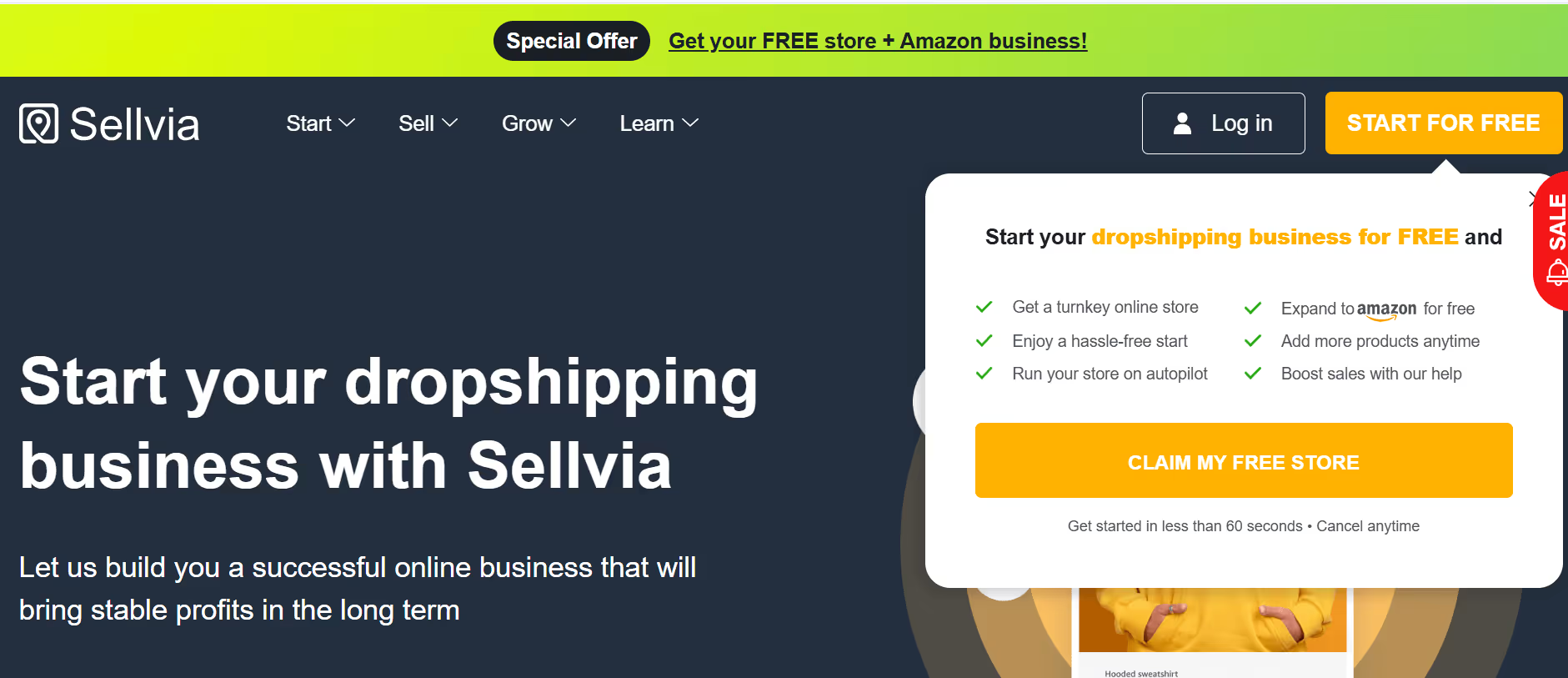
Sellvia is a US dropshipping supplier and fulfillment service. Instead of waiting weeks for overseas orders, customers get their items in 1–3 business days. It’s attractive for sellers targeting American buyers who value speed. Beyond logistics, Sellvia also provides a catalog of trending products, store setup services, and marketing support. For sellers who want an all-in-one dropshipping partner, Sellvia has become a solid choice.
Key Features:
- US-Based Fulfillment Center: Sellvia stores products in its California warehouse. Orders are processed quickly, cutting down shipping time dramatically. This setup appeals to sellers who want Prime-like speed without relying on Amazon.
- 1–3 Day Shipping: Most orders reach customers within a few days. Faster delivery means fewer refund requests and happier buyers. This feature alone makes Sellvia stronger than overseas-based dropshipping platforms.
- Ready-to-Sell Stores: Sellvia offers prebuilt online stores filled with trending products. Beginners can launch without technical skills or product research. This is ideal for people who want to start selling immediately.
- Winning Products: Instead of browsing through millions of listings, you get a hand-picked collection. These products have already proven strong demand. It reduces guesswork and helps sellers build profitable stores faster.
- Marketing Materials Included: Sellvia provides product descriptions, images, and even ad creatives. This saves sellers hours of preparation. It also helps keep branding consistent across all store channels.
- Integration with Shopify and WooCommerce: You can connect Sellvia directly to your e-commerce platform. Syncing products, tracking orders, and updating inventory happens in real time. This automation simplifies operations for busy store owners.
- Subscription Pricing: Sellvia charges a monthly subscription for its services. However, the value comes from faster shipping and bundled tools. For sellers focused on the US market, it can easily justify the cost.
7. Sendcloud

Sendcloud is a shipping automation platform built for European e-commerce sellers. While not a traditional dropshipping catalog like Doba, it plays a key role in order fulfillment. Sendcloud integrates with popular platforms like Shopify, WooCommerce, and Magento, letting sellers access multiple couriers from one dashboard. Instead of juggling shipping accounts, you manage everything in a single system. Its main appeal lies in helping online stores cut costs, simplify returns, and speed up delivery.
Key Features:
- Courier Networks: Sendcloud partners with DHL, UPS, FedEx, and many regional couriers. Sellers can compare rates and delivery times without leaving the dashboard. This flexibility makes it easier to pick the best option per order.
- Automated Label Printing: You can generate shipping labels instantly from your dashboard. This removes repetitive manual work for every order. The feature saves time and reduces errors when fulfilling dozens of packages daily.
- Custom Checkout Options: Sellers can give customers more delivery choices at checkout. Options like home delivery, parcel locker pickup, or same-day shipping improve customer satisfaction. It also creates an experience closer to big retailers.
- Returns Portal: Sendcloud includes a branded returns portal for customers. Buyers request returns themselves, which keeps your inbox clear of constant “How do I return this?” emails. A smoother return process helps stores maintain trust.
- International Shipping: With access to global couriers, Sendcloud makes cross-border selling less stressful. You can reach buyers outside your home country without needing multiple shipping accounts. This feature appeals to sellers expanding into Europe-wide sales.
- Analytics Dashboard: The platform provides reports on shipping performance and costs. Sellers can identify which couriers are most reliable or which shipping methods eat into profits. Better insights mean smarter shipping decisions over time.
- Scalable Pricing: Sendcloud offers different tiers for small sellers and large-scale businesses. You only pay for the level of service you actually use. That way, you don’t overspend when testing or scaling.
8. Rokt
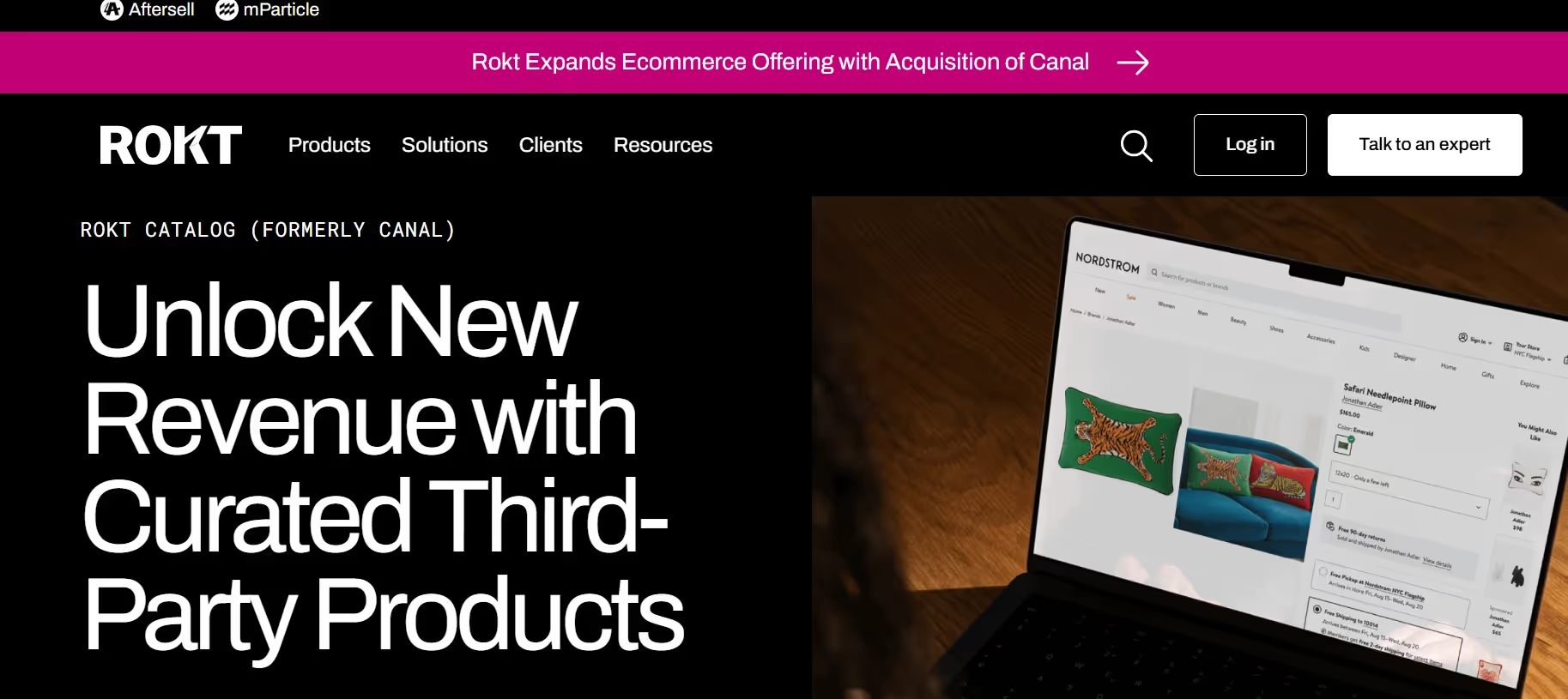
Rokt lets you unlock new revenue opportunities with curated third-party products. Its AI lets you onboard new customers at record speed and handles 90% of product onboarding and data mapping. Rokt has 1900+ curated brands available with 1.2 million products listed, all ready for mechandising. You can get up to 6x faster upload speeds vs. legacy benchmarks. For brands, Rokt is your chance to be listed on top-tier e-commerce sites and trusted marketplaces. You can rely on its retail partners across its network. You can also launch shoppable ads with Rokt and boost every sales touchpoint.
Key Features:
- Custom carts and checkouts: You can boost sales and unlock real value for your customers with Rokt's post-purchase upsells and custom carts. Delight customers and unlock revenue in every transaction on the payments page.
- Up to 30% More Revenue Per Client: Aftersell by Rokt lets you increase cart value with seamless upsells. Maximize your AOV with incentives that enhance and not interrupt the shopping experience. Drive more revenue at every checkout.
- Personalized Product Offers: Rokt Catalog enables tailored product recommendations at checkout. Customers see items that actually match their shopping habits. This increases conversion rates since the offers feel more relevant.
- Multiple Revenue Streams: Instead of relying solely on base product sales, Rokt helps you add extra revenue streams. Sellers can use upsells, cross-sells, and targeted bundles to grow profits without new customer acquisition.
- Targeted Campaigns: You can run campaigns based on customer segments. For example, pushing accessories to buyers of electronics or promoting seasonal items. Segmented offers keep shoppers engaged instead of showing generic deals.
- Data Analytics and Reporting: Rokt provides reporting on upsell performance. Sellers see which products perform best and which campaigns underperform. This makes it easier to refine offers and increase profit per order.
- Scalable and Flexible: Whether you run a small store or a high-traffic site, Rokt adapts to your order volume. The system scales without forcing you to change platforms. This makes it suitable for long-term use.
Conclusion
Doba offers a gateway into dropshipping, but it’s not the only door worth opening. With higher fees, thinner margins, and limited supplier control, many sellers look elsewhere. The good news is there are plenty of platforms in 2025 that give you stronger features, faster shipping, and more reliable suppliers. From AliDrop’s automation to Spocket’s US and EU network, you’ve got options that fit different store goals. The key is to test what aligns with your market. Choosing wisely now saves you time, money, and stress later.
Doba Alternatives FAQs
What are the best Doba alternatives in 2025?
The best Doba alternatives in 2025 include AliDrop, Spocket, Modern Dropship, Rithum, ShipRocket, Sellvia, Sendcloud, and Rokt Catalog. Each offers different strengths like faster shipping, better supplier networks, or automation features. These platforms give you more flexibility and higher profit potential compared to Doba’s subscription-based catalog access.
Why do sellers switch from Doba to other platforms?
Many sellers move to Doba alternatives because of high subscription fees, thin profit margins, and lack of exclusive products. Platforms like Spocket or Sellvia provide faster shipping and verified suppliers. Choosing an alternative often means stronger support, better tools, and more opportunities for building a sustainable dropshipping business.
Which Doba alternatives are best for US-based sellers?
For US-based sellers, Sellvia and Spocket stand out as strong Doba alternatives. Sellvia offers a California warehouse with 1–3 day shipping, while Spocket connects you to verified US suppliers. These options improve delivery speed, reduce refunds, and build customer trust compared to long shipping times from overseas suppliers.
Are Doba alternatives cheaper to start with?
Yes, many Doba alternatives cost less upfront. Platforms like Spocket offer free trials or flexible plans, while Sellvia provides bundled services for a flat subscription. Doba requires paying just to access its catalog, which can be restrictive. Alternatives allow new sellers to test markets without high early costs.




















